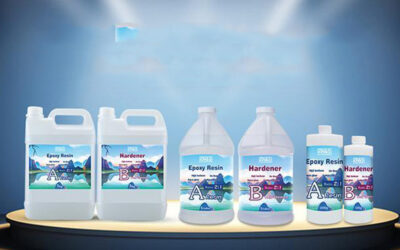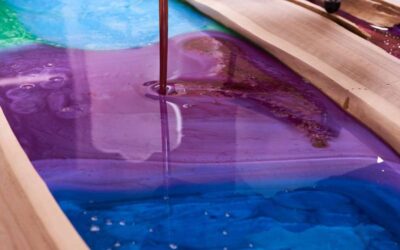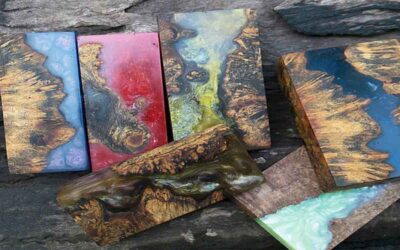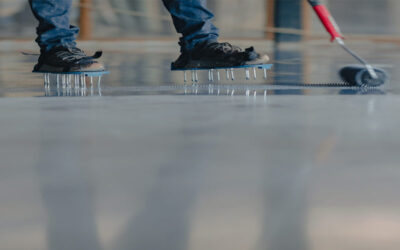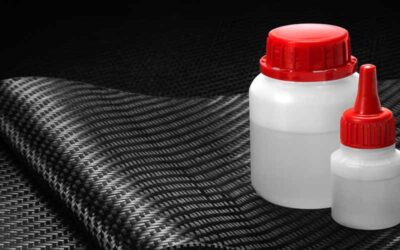Epoxy resin is both the uncured and the cured forms of resin. There are a lot of industrial interests and various uses of this resin because of its beauty and amazing characteristics. It works like glue for sticking fibers together. Tables, furniture, building appliances, jewelry, and various forms of art can be made with epoxy. Epoxy resin can make protection from water; it is waterproof.
Epoxy Resin Definition
Epoxy resin is a very high-performance adhesive. This is used for making laminated woods for decks, walls, roofs, and other parts of buildings and in many other products that need strong bonds to other elements.
For instance; concrete or wood. Epoxy resin can stick to metal, wood, stone, glass, and a few plastics. Epoxy resins are more heat resistant and chemical resistant than glues.
History of Epoxy Resin
The word Epoxy is divided into two Greek prefixes which are “epi” and “oxy”. The word Epi means “upon” and the word Oxy means sharp. Oxy also means acidic.
Its adhesiveness has been proved and witnessed by thousands of people for 100+ years now. Yes, epoxy resin has 100+ years of history.
The journey of Epoxy started in Russia from the 1890s to the 1930s. Epoxy’s existence was proven during the early 1890s but got its popularity during the mid-1950s.
A Russian chemist, Prileschajev first observed that olefins react with a peroxybenzoic acid which reaction formed epoxides which formed epoxy.
During the mid-1930s, P. Shellac, a German granted a patent for preparing a polyamine with a high molecular weight. He did it by using epoxide compounds. The first epoxy was synthesized long ago, in 1936.
Dr. Pierre Castan, a Swedish, and Dr. S.O. Greenlee, an American, together, recognized the chemistry of epoxy that people still use. So, they issued a different patent by the end of the 1930s.
Dr. Pierre Castan’s work was licensed by the company Ciba which is situated in Switzerland.
So, we can say that though Ciba was the first company that commercialized Epoxy resin in the year 1946.
Aerospace was the 1st commercial field that was responsible for penetrating epoxy in 1950. Nan Ya Plastics has the patent of epoxy resin varnish and it is for laminates.
Types of Epoxy Resin
Epoxy resins are popular for their:
- High level of strength
- Lowness of shrinkage
- Amazing adhesiveness
- Chemical resistance
- Solvent resistance
- Last but not the list
- Very minimal cost and
- Low level of toxicity.
Resins are classified into various groups. One of which is Epoxy.
There is not any particular classification of epoxy but it can be divided into 3 primary classes used in composite applications. Which are:
- Phenolic glycidyl ethers
- Aromatic glycidyl amines and
- Cycloaliphatic.
Function of Epoxy Resin
The functions of epoxy resin are many. The use of resin can be seen from ancient times in human history.
Now resin is widely used in households and even for commercial & industrial purposes.
As resin has heat & chemical resistance, high film elasticity, and many strong qualities; it is well known for its versatile uses.
Epoxy resins are widely used because of their strong heat & chemical resistance, strong adhesion, and toughness.
Because of the properties of epoxy resin, it is used for structural purposes.
It is used for the construction of vehicles, bicycles, aircraft.
In the electronic industry, epoxy resin is used in the production of insulators, motors, transformers, etc.
Epoxy resin is also used in painting materials. For tough, protective coating epoxy resin is a great option.
As epoxy resin has strong adhesive properties, it is used for repair objects. Fragile items such as glass, ceramics, etc. can be easily fixed with epoxy resin.
Best Epoxy Resin To Buy
There is now a huge number of epoxy resins for different purposes in the market. It is very important to find a suitable resin for the targeted purpose.
We have good knowledge about Epoxy Resin so we can provide the needed overview of which epoxy resin is particularly suitable for your project and for fulfilling your purpose.
Epoxy Resin for Table Top
Tables are a part and parcel of our house. We eat at the table, study on the table, work on a table, write and do other stuff on our table. If the table is beautiful and unique, it can enhance our productivity and mood.
Tables made of epoxy resins are very beautiful to look at. These are uncommon and unique. Moreover, various colorful designs can be done on the table by using epoxy resin.
Thus, a Table made from epoxy resin represents people’s unique choices and personalities.
FAQ
There are a great number of questions about Epoxy resin in people’s minds as many people are curious and want to know more about this product.
People are amazed and attracted by the colors, designs, and various usage of this product. They want to know more and that’s why they search for any queries regarding epoxy resin.
1. What is an epoxy resin used for?
Ans: Resin is mainly used as glue – to stick fibers together. In the art and jewelry industry, the resin is used for making furniture, trash bins, and various jewelry items.
2. What is the difference between resin and epoxy?
Ans: Epoxy resin is one kind of resin
3. What is an epoxy resin made of?
Ans: Epoxy resins usually are plant products consisting of amorphous mixtures of carboxylic acids, essential oils, and isoprene-based hydrocarbons which come from trees and shrubs.
4. What is the epoxy resin price?
Ans: Epoxy resin comes at $63.99 per gallon. This price can vary from country to country. The price also depends on the quantity.
5. How long does the epoxy smell last?
Ans: 2 to 10 hours
6. What are the disadvantages of epoxy resin?
Ans: Epoxy adhesives are sometimes hard and brittle. This problem can be rectified to exhibit flexibility.
7. Why is epoxy the most popular resin?
Ans: Epoxy is most popular because of its high strength bonds. It is chemical and moisture resistant and high modulus.
8. Can you buy epoxy resin at Walmart?
Ans: Yes, you can buy epoxy at Walmart.
9. How much is a gallon of epoxy resin?
Ans: Epoxy resin comes at $63.99 per gallon. This price varies from country to country.
10. Is there a cheaper alternative to epoxy resin?
Ans: Polyesters are a cheaper alternative to epoxy resin.
11. What can be used to color epoxy resin?
Ans: Acrylic paints, Alcohol-based colors, Powders such as micas and eyeshadows, Glitters, Kitchen spices, Sidewalk chalk, Watercolor paints.
12. What is Epoxy?
Ans: An epoxy is a thermosetting polymer with special mechanical properties and resistance. For the cured end product of all of the fundamental components inside epoxy resins, the name epoxy may be used. An epoxy resin is a type of thermoset polymer formed from a monomer containing at least two classes of epoxides. Epoxy resins may be homopolymerized or curatively cross-linked into a three-dimensional network.
13. What is epoxy used for?
Ans: In the manufacturing of adhesives, fibers, paints, coatings, primers and sealers, flooring, and other items and components used in construction and building applications, these are the things in which epoxy resins are used.
14. Is epoxy dangerous?
Ans: The risk of damage sustained by epoxy resin ingestion can be considered very low. It should be said that pure epoxy resins are known as non-toxic. There is certain toxicity in the majority of curing agents in use today. But due specifically to toxicity, it needs quite a significant amount of damage.
15. Why is epoxy so expensive?
Ans: Owing to its strength and formulation requirements, epoxy is typically more costly than resin. Resin, due to its lower cost, is more common for art and jewelry making.
16. How long does the epoxy smell last?
Ans: Due to the V.O.C., there is a very heavy odor in epoxy and it will take between 1-3 days to fade away until ventilated.
17. Is epoxy cancerous?
Ans: Testing on laboratory animals found that skin cancer was caused by older epoxy resins. It is due to epichlorohydrin, which also causes human cancer. Newer epoxy resins, however, contain fewer epichlorohydrin, so they do not allow animals to grow cancer.
Different glycidyl ethers in epoxy materials may also lead animals to have genetic mutations. Although this fact means that these ethers could be cancer-causing chemicals, it is not yet clear if others cause mutations or cancer.
18. Is epoxy waterproof?
Ans: Yes, In several fields, including home building, epoxy resins are commonly used as coatings and waterproofing. The resulting hardened epoxy is extremely waterproof, a detail that has not missed the notice of the founders of this material.
19. Can I use epoxy indoors?
Ans: Many epoxy goods are now absolutely safe to use indoors and in truth, you would have little to think about if you take the necessary precautions, because the safety equipment on the market today is outstanding and more than good enough to cope with the slight dangers posed by epoxy.
20. Is epoxy safe to drink from?
Ans: Though epoxy has food protection does not mean that it is okay to always eat or drink directly from an epoxy base.
21. What are the disadvantages of epoxy flooring?
Ans: Epoxy floors are rough and thus when walking, there is touch noise. Flexible polyurethane floors are commonly found in office spaces and homes for that purpose.
An epoxy floor is very cold without floor heating, equivalent to tiled floors.
If the substrate is irregular or broken, ripples may become noticeable on the surface. This only occurs where existing cracks can no longer be bridged by the epoxy floor. On the substrate, the floor adheres. The floor is vulnerable to UV radiation without a final finish. Luckily, the UV tolerance can quickly be increased with 1 or 2 coats of an HIM finish coat.
22. Does epoxy bond to latex?
Ans: The epoxy bond over latex and acrylic paint will fit perfectly. It would not bond to paint based on oil.
23. How long do Epoxy floors last?
Ans: In heavy traffic, epoxy flooring lasts 2 to 3 years. Industrial facilities should predict this experience, such as garages, hotels, or warehouse spaces, with plenty of frequent foot traffic. Epoxy flooring can last much longer, however with good care and maintenance.
24. What can I use instead of epoxy?
Ans: Nice casting materials may be hard plaster or concrete, and they’re cheaper than other resins. Definitely a decent source of low-cost material for bigger parts. So these can be used instead of epoxy.
25. Which epoxy is best for wood?
Ans: For any wood project, Pro Marine Supplies Epoxy is undeniably the best option, but it has several other applications. But if expect anything that is equally acceptable for multiple projects, then preference should be given to East Coast Resin Epoxy.
26. How much is a gallon of epoxy resin?
Ans: For water-based epoxy paint, prices for only the epoxy will start at around $30-$50 a gallon and can be $45-$150 or more a gallon for solvent-based or 100 percent solid epoxy coatings. More gallons can be needed for a dense coating to cover the same floor space as a thinner paint.
27. Why does epoxy stink?
Ans: Epoxy drying, even when fully dried, has a time in which an odor is produced. This is because the epoxy curing process takes time near about months. On a hot day, however, 25c, for instance, cures epoxy at a much quicker pace. A stronger odor is created by faster curing.
28. Does epoxy smell strong?
Ans: Generally, all epoxy resins have a sort of odor. This scent can range from discrete and innocuous, to potent and dangerous. These overpowering undesirable smells are also suggestive of health risks, and the consumer should be advised by common sense to be careful about goods that emit such bad smells.
29. Is epoxy explosive?
Ans: During manufacturing processes, dust will be created by practices such as grinding, polishing, sawing, chopping, and sanding, and at least some of them may be small enough to be potentially explosive. Epoxy Resin is inflammable and is an explosion hazard.
30. Are epoxy floors worth it?
Ans: Flooring with epoxy is incredibly strong and can last for years to come. With other choices, you can find that to keep the floors looking nice, you must reapply the paint regularly. For epoxy, for years after the coating is applied, you won’t have to touch the floors again. That’s why epoxy floors worth it.
31. Do you need to wear a mask when using epoxy resin?
Ans: Wearing a particle mask or a NIOSH respirator certified for dust while sanding, grinding, or drilling resin needed. It is critical that the resin dust is not inhaled, which could likely induce an allergic response.
32. How do you get rid of the epoxy smell in the house?
Ans: Crank it up to 80 degrees and in two or three days, the scent should be gone. Place a blowing fan somewhere in your house and crack a window in the garage so that some smell will blast out from the slight positive pressure.
33. Does epoxy crack easily?
Ans: Though epoxy coatings do not break under intense heat or cold by themselves, concrete does. The pressures associated with concrete cracks due to settling, dry shrinkage, or other causes do not tolerate epoxy coatings.
34. Do epoxy floors scratch easily?
Ans: Epoxy floors can highly impact resistant and difficult to scratch, dent, or damage.
35. Is epoxy slippery when wet?
Ans: Epoxy flooring is not as slippery as it seems and to keep the floor very dry, even when wet, it is easy to apply a skid-resistant additive to the topcoat. Epoxy flooring can get very slippery when wet, particularly with oil spills, without a nonslip additive.
36. Does epoxy flooring crack?
Ans: There are very rigid epoxy floors. Epoxy has very little durability as a tool, so subtle variations in the base will lead to cracks emerging in an epoxy sheet, leaving you with broken floors that are impossible to patch without recoating with a new epoxy sheet.
37. Are the epoxy floors cold?
Ans: Epoxy flooring is to be sure, not as hot and cushy on the toes as a carpet. Although it’s not as cold as ceramic tile or ice. In terms of heat absorption, Epoxy ranks in the center.
38. Which is better epoxy or tiles?
Ans: Tile can be durable, but it’s too inclined to cracks and chips. Epoxy flooring can last for numerous a long time without chipping, splitting, blurring, or coming free. Since there are no grout lines and no require for additional cement, once the epoxy floors are put and cured, it never moves or appears signs of coming up from the subfloor. Thus epoxy is better.
39. Which is better: epoxy or polyurethane?
Ans: Compared to epoxy, polyurethane floors are mostly smoother and more elastic, giving them greater resistance to rubbing, suitable for spaces such as multi-deck car parks that require high levels of foot traffic.
40. Can you epoxy over old epoxy?
Ans: Yes. A chemical bond is not feasible because the epoxy has healed, so what is called a mechanical bond is necessary. This simply means that before the next coat is applied, the cured epoxy must be lightly sanded: the first coat should have a surface that is matt, almost white.
41. Can I pour epoxy over paint?
Ans: Yeah, after it has dried completely, Art Resin epoxy resin can be over oil paint. In any dry oil painting, it will completely bond and seal.
42. What paint can I use on epoxy?
Ans: Acrylic paint is the easiest paint to use on the resin. Ensure to prime the surface first and then spray with acrylic paint. Users can also spray polish to help the project last longer and the resin paint can stick to the wall.
43. Is epoxy safe for kitchen countertops?
Ans: Epoxy is warm safe, but not heatproof. It’s smart to use trivets for hot pots to ensure epoxy counters or any sort of kitchen countertop from warm harm. Most epoxy items are considered non-toxic and are food-safe for countertops once the epoxy gum has cured.
44. How much does it cost to epoxy the floor?
Ans: With most homeowners paying from $1,320 and $3,080 on both supplies and construction, epoxy flooring costs vary from $750 to $4,928. Depending on the amount of epoxy used and labor costs, epoxy coating costs vary from $3 to $7 per square foot.
45. What kind of epoxy should I use for countertops?
Ans: Countertop Epoxy’s FX Poxy is a resin formulated especially for kitchen countertops, bar tops, and many other surfaces to produce an incredibly dense, maintenance-free finish that also has unique polymers that make it the industry’s most UV-resistant epoxy. It can be used for countertops.
Final Thought
Epoxy resin is one type of thermoset plastic that is made by the reaction of two or more chemical elements.
Epoxy resin is used for a wide range of industrial applications due to its rigidness, strong adhesion, chemical resistant power, and other unique qualities.


